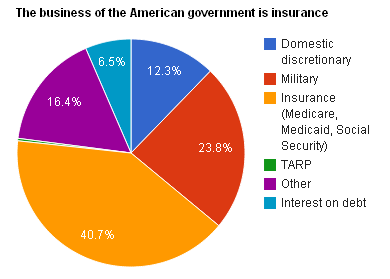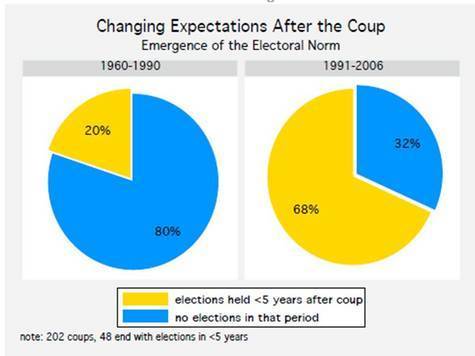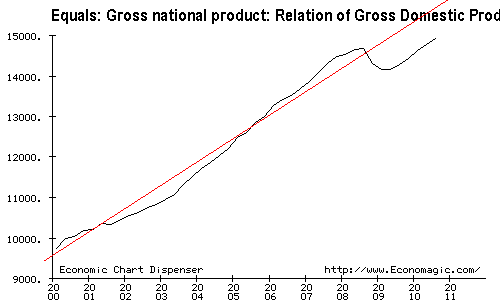Matthew Yglesias's Blog, page 2420
February 14, 2011
Schools and the Baumol Effect

The so-called "Baumol Effect" is something that's pretty widely known even as its implications are rarely confronted squarely. For example, suppose you're thinking about spending on teacher compensation. The following options are available:
— Class size can steadily increase over time.
— Teacher pay relative to average pay can steadily decline over time.
— Taxes can steadily rise over time.
As of January 2010 only four percent of people thought public school teachers are paid too much. And yet the public is hardly clamoring for larger class sizes or endless tax hikes. However you feel about this, though, the point isn't just that tradeoffs exist at the margin but that the problem continually recurs as long as average productivity and compensation are rising in the private sector.


Forgotten Moments in the American Welfare State

Something that I find interesting is the way progressive folk memory often distorts the actual process through which we got to the present day. For example, the FDR of myth was a steadfast fighter who proclaimed "I welcome their hatred" and rallied the public to enact the New Deal we know today. Then there's this account from The Politics of Attention:
On August 28, 1950, President Truman enthusiastically signed Social Security reforms he had urged for years, reforms that expanded Old Age and Survivors Insurances (OASI) benefits by 77 percent, expanded the covered population dramatically, and decreased the required contributions in the system. [...] The 1950 legislation radically transformed the small program established in major amendments to the Social Security Act in 1939. The 1950 statutory changes caused an explosion in Social Security expenditures. From FY 1949 to FY 1950, real expenditures grew 3 percent. From FY 1950 to FY 1951, they grew 25 percent, and the next year they grew an additional 37 percent—the largets two-year percentage increase in the history of the program—even though most payments would come much later as the newly covered persons retired. By 1952, expenditures had increased by an astounding 71 percent percent, and expenditures increased 10 percent a year or more for the next three fiscal years.
Needless to say, not in Pete Peterson's wildest dreams will we be moving to a Social Security system that's remotely as stingy as what FDR actually enacted. And even though we recently went through a spasm of Truman hagiography, I don't recall him being widely hailed as one of the major architects of the social insurance state.


The Unknown Health Care Bill
One of the fascinating things about the Affordable Care Act is that for all the political sturm und drang it's sparked, the vast majority of its provisions have been subjected to almost no public controversy. For example, Tamara Fucile recently joined CAP from Jeff Merkley's office as our VP for Government Affairs and I read on her bio page that she "was influential in inserting a provision into the Affordable Care Act that guarantees new working mothers break time to express milk."
That sounds excellent. There are a wide range of social and economic practices that rely on the implicit assumption that all workers are men. This was approximately true at one point in the economic history of the United States, especially if you only consider employment at large firms and neglect domestic servant types, but it's currently obsolete and we now have a lot of facially neutral practices that de facto discriminate against women. But how many among us had any inkling that this provision was in the law? Not me, to be sure. And most people are busy working all day, not reading random stuff about politics.


Nixon in Israel

Bibi Netanyahu tacks toward the populist left on economic policy to ensure a free hand in steering a hard-right course on security:
Prime Minister Benjamin Netanyahu presented the Israeli public with a package of benefits on Thursday, in which the minimum wage will increase, and gasoline, water and public transportation prices will decrease. The steps Netanyahu presented along with Finance Minister Yuval Steinitz on Thursday are an effort to stave off a general strike due to the recent price hikes of basic goods such as bread, water, and gasoline.
If fighting inflation with a minimum wage hike works, they're going to have to start rewriting some economics textbooks.


The Drive For Ineffective Government
Good chart from Ezra Klein:

But I think this explanation is incomplete:
Politicians don't take the axe to non-defense discretionary spending because they think Teach for America or the food safety infrastructure — both of which the Republicans are proposing to cut dramatically — is more wasteful than the Pentagon or the health-care system. They do it because Teach for America and the food safety system is less politically powerful than the Pentagon or Medicare beneficiaries. The budget ends up like the yard of a man who owns only a lawnmower: The grass is trim, but the trees are overgrown and the ivy is everywhere and the gazebo is falling apart. Yet we keep mowing, because that's what we feel able to do.
That's part of the story, to be sure. But the other thing I would note is that while administrative costs of the regulatory state are only a very small part of the government overall financial commitment they're a very important area of public policy. The conservative coalition in the United States contains a lot of people who don't like paying the taxes that finance Medicare, but few people who have a direct self-interest in old people not getting medicine. By contrast, the conservative coalition really wants the regulatory state's functions to be performed poorly. Even if refusing the pay the electrical bill for the EPA would have a tiny impact on the budget, Koch Industries would still derive massive benefit from inconveniencing environmental regulators. Banks want financial supervision to be done poorly. Employers everywhere smile at the idea of labor law going unenforced for want of bureaucrats to process the complaints. Rich people want IRS tax enforcement to get spottier.
Actually signing your name to the "Make It Easier to Dump Toxic Waste In The River Act of 2012″ is unlikely to play well. But if you impose a nominal spending freeze on the agency charged with enforcing the Clean Water Act, then inflation and economic growth ensure that the level of regulatory supervision will decline. If you impose nominal spending cuts, the level of regulatory supervision declines more sharply. And accomplishing this through the spending channel is a good way of hiding the ball rather than making the case directly that it should be made easier to break the law.


The Friendly Coup
Hein Goemans and Nikolay Marinov find that nowadays coups generally lead to new elections rather than to stable dictatorships:

The relevance to the Egyptian case is clear. Robert Farley writes about some possible causes of the change. The trouble looking forward is that the Egyptian military seems to directly benefit from Egypt's dysfunctional economic policies.


If Nobody Has Money, Houses Have To Be Cheap
David Streitfeld writes that "The rolling real estate crash that ravaged Florida and the Southwest is delivering a new wave of distress to communities once thought to be immune — economically diversified cities where the boom was relatively restrained."
First see David Leonhardt on whether the boom really was all that restrained in Seattle. But the other examples are better and I think this is a reminder that the relationship between the housing market and the economy is push and pull. There was, in fact, an unsustainable bubble in house valuations across much of the country that led to localized unsustainable booms in home building and related activities. That process came to an end in 2006-2007 and we were in recession all throughout 2008 as the unemployment rose and the construction boom unwound. But then came the really giant collapse of aggregate demand in fall of 2008 continuing through the subsequent winter. Now we're way below the long-term trend level of overall nominal spending:

Overall nominal spending equals overall nominal incomes. And we live in an economy where lots of us have contractual obligations that are nominally denominated. That's my cable bill, it's my cell phone bill, and it's my mortgage, and it's probably your mortgage too. Fortunately for me, my nominal income isn't below its pre-crisis trend growth path. But America's collective income is. So if our nominal income is below where we expected it would be when we signed the contracts, people are going to be unable to pay bills. That means, among other things, serious housing problems even in jurisdictions that never suffered from noteworthy construction booms.
Indeed, though there's definitely excess housing in Florida and parts of the southwest there's reason to believe we have an overall housing shortage right now. But people need money to purchase housing with.


It's Not The People Doing Something Real
CC asks:
Where did you get the aerial shot of DC that you use as a header? I'd like to see a clearer version and know exactly what I'm looking at. This may be obvious to a USian, but I'm a Brit, even though I've been here a while.
It's a version of a satellite image I grabbed from Google Earth, that's been given an unusual orientation. On the right-hand side you can see the Jefferson Memorial and the tidal basin. To its left is the Washington Monument, the Ellipse, and the White House. Moving left on the image amounts to moving north by northeast, the point of which was to have the left-hand side be the neighborhood where I lived at the time the graphic was created (you can sort of make out the Cardozo High School football field) while the right-hand side incorporates recognizable landmarks. It's an unfamiliar take on the familiar capital city. Like the blog, get it?

The above is maybe the base image I would use based on where I live now.


The Social Responsibility to Rent-Seek?

Milton Friedman's notion that "the social responsibility of business is to increase its profit" is one with a large number of adherents.
It seems to me, however, that if taken seriously this is an attitude that's curiously destructive of the underpinnings of the capitalist order. After all, this implies that a business executive has not only the right as a citizen of a democratic country but a moral obligation to dedicate his energy and that of the firm he manages toward erecting regulatory barriers to competition and to begging for bailouts and subsidies. The Friedman view is that an entrepreneur who's obsessed with creating great products is not just in some loose sense a sucker compared to the one who's more focused on creating a politically entrenched monopoly, but that he's also guilty of some kind of ethical failing.
I think I need to re-read The Protestant Ethic and the Spirit of Capitalism but my point is basically that for the system to work you need some kind of thicker ethics than "greed is good."


Budget Day

I think the release of a presidential budget request would be a very interesting thing were we in a situation where the president's party controlled congress. Congress never just does what the president wants, but his agenda-setting powers are formidable under that kind of situation. Given the control of the US House of Representatives by feisty "young gun" conservatives, I'm not really sure what delving into the accomplishes.
So instead an observation. If for some reason you think that making politically credible commitments in 2011 to reducing the budget deficit in 2012, 2013, 2014, and 2015 is important, you could always do the following. Have the President of the United States say the words "I will veto any legislation that increases the medium-term budget deficit. Yes that means extension of the Bush tax cuts. Yes that means the Medicare 'doc fix.'" That doesn't mean we can't extend some or all of the Bush tax cuts or keep paying doctors lots of money for Medicare treatments, but it would mean congress needs to develop pay-fors. The deficit-reducing punch of that simple commitment—"no need deficit increasing bills signed into law"—is actually quite dramatic. And it can be implemented unilaterally.


Matthew Yglesias's Blog
- Matthew Yglesias's profile
- 72 followers



